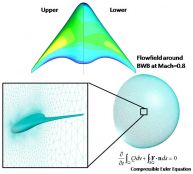The aim of our study is aerodynamic design optimization for next generation transport. Computational fluid dynamics (CFD) is used for aerodynamic evaluations and genetic algorithm (GA) is used for global exploration of optimum geometry. We are also working on a multi-disciplinary design problem dealing with aerodynamics and structural dynamics simultaneously.
Boundary-layer instability and transition are investigated both experimentally and numerically to improve our ability of transition prediction and control for development of laminar flow control (LFC) technology. Of particular interest are effects of distributed surface roughness of very small height/amplitude on the instability of wall bounded shear flows. Two- and three-dimensional roughness elements of various geometries are considered.
Aerodynamic noise generated from the high-lift devices such as a leading-edge slat is known to be a significant contributor to airframe noise during the take-off and landing phases. Reduction of such aerodynamic noise radiated from aircraft wing is one of the most important and challenging technologies for the next-generation aircraft development. Detailed experimental and numerical investigations are conducted to obtain better understanding on noise generation mechanism and effective control techniques of suppressing aerodynamic noise. The research includes manipulation of wing boundary-layer to suppress the acoustic feedback mechanism which is responsible for trailing-edge noise of airfoil.


